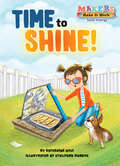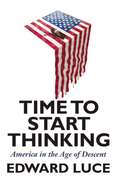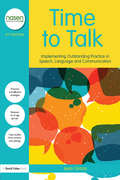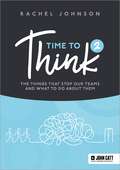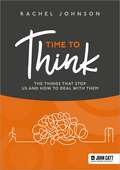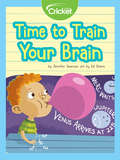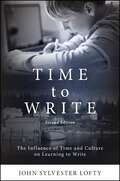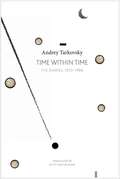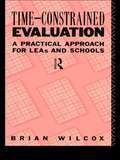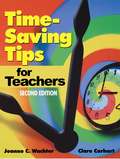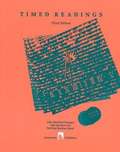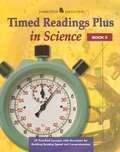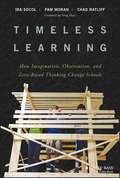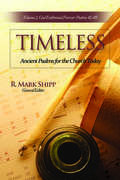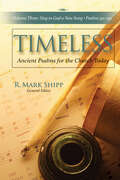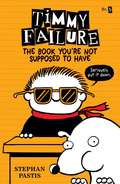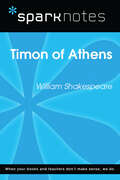- Table View
- List View
Time to Shine! (Makers Make It Work)
by Catherine DalyBoom! Thunder crashes, and the electricity goes out. Sammi is crushed. Her parents had a fancy dinner planned! But no lights doesn't mean no power. Can Sammi use sun power to save the day? Tying into the popular Makers Movement, Makers Make It Work is a series of fun easy-to-read stories that focus on problem-solving and hands-on action. This charming story explores the Makers theme of Engineering and includes explanatory sidebars and a catapult activity for young makers to try themselves!
Time to Start Thinking: America in the Age of Descent
by Edward LuceDestined to spark debate among liberals and conservatives alike, noted journalist Luce advances a carefully constructed and controversial argument that America is losing its pragmatism--and the consequences of this may soon leave the country high and dry.
Time to Talk: Implementing Outstanding Practice in Speech, Language and Communication (nasen spotlight)
by Jean GrossTime to Talk provides a powerful and accessible resource for practitioners working to improve children’s language and communication skills. Showcasing effective approaches in schools and settings across the country from the early years through primary and secondary education, it summarises research on what helps children and young people develop good communication skills, and highlights the importance of key factors: a place to talk, a reason to talk and support for talk. This timely second edition has been fully updated to reflect Pupil Premium, curriculum, assessment and special needs reforms, and can be used by individual practitioners as well as supporting a whole-school or setting approach to spoken language. It includes: whole-class approaches to developing all children and young people’s speaking and listening skills; ‘catch-up’ strategies for those with limited language; ways of differentiating the curriculum for those with difficulties; ways in which settings and schools can develop an effective partnership with specialists to help children with more severe needs; models schools can use to commission their own speech and language therapy services; examples of good practice in supporting parents/carers to develop their children’s language skills; and answers to practitioners’ most frequently asked questions about speech and language. Now in full-colour, this practical and engaging book is for all who are concerned about how to help children and young people with limited language and communication skills – school leaders, teachers, early-years practitioners, and the speech and language therapists they work with.
Time to Think 2: The things that stop our teams and what to do about them
by Rachel JohnsonBeing a leader involves having followers and working as a team. Sometimes our teams get stuck and issues emerge that we don't always feel equipped to deal with. How do we get buy in, keep momentum, recognise and overcome dysfunction, and get the best out of introverts and extroverts so that everyone feels safe and brave? This book is for people who want to be daring and responsible in their leadership, who want to embrace paradoxes, and understand how to create and maintain thriving teams. Use this book to help you work through the issues that are most relevant to you and your teams so that you, and they, can thrive.
Time to Think 2: The things that stop our teams and what to do about them
by Rachel JohnsonBeing a leader involves having followers and working as a team. Sometimes our teams get stuck and issues emerge that we don't always feel equipped to deal with. How do we get buy in, keep momentum, recognise and overcome dysfunction, and get the best out of introverts and extroverts so that everyone feels safe and brave? This book is for people who want to be daring and responsible in their leadership, who want to embrace paradoxes, and understand how to create and maintain thriving teams. Use this book to help you work through the issues that are most relevant to you and your teams so that you, and they, can thrive.
Time to Think: The things that stop us and how to deal with them
by Rachel JohnsonBeing a leader is a wonderful privilege but can also come with challenges we don't always feel prepared for. How often do we tie ourselves in knots wondering about the right way to deal with a difficult situation at work? Or wondering why no one ever told us how to manage some of the challenges? This book is for people who need practical ways of tackling the tricky issues in leadership to move forward courageously. From people pleasing to crucial conversations, we look at ten areas that can cause us to be 'stuck' and how we can get ourselves free. Dip into this book when you need some support to inspire, motivate, and equip you in whatever stage of leadership you're at so that you can lead more confidently and freely, and be your best more of the time.
Time to Think: The things that stop us and how to deal with them
by Rachel JohnsonBeing a leader is a wonderful privilege but can also come with challenges we don't always feel prepared for. How often do we tie ourselves in knots wondering about the right way to deal with a difficult situation at work? Or wondering why no one ever told us how to manage some of the challenges? This book is for people who need practical ways of tackling the tricky issues in leadership to move forward courageously. From people pleasing to crucial conversations, we look at ten areas that can cause us to be 'stuck' and how we can get ourselves free. Dip into this book when you need some support to inspire, motivate, and equip you in whatever stage of leadership you're at so that you can lead more confidently and freely, and be your best more of the time.
Time to Train Your Brain
by Jennifer SwansonUsing shorthands, rhythms, flavors, and cartoons, Sam's classmates help him with memory tricks to study for the big test!
Time to Write, Second Edition: The Influence of Time and Culture on Learning to Write
by John Sylvester Lofty"To read John's work is to take on the role of a patient listener … A book, like a piece of music, is scored for time, and I feel Time to Write is scored adagio.… I believe that Time to Write can be read as a critique of [the] time-chopping approach to education—and an argument for presence, for being fully open to experience, for being there … To do good work, we must enter something like 'island time' or what John calls 'existential time'—or what is sometimes called 'flow' when we lose, at least temporarily, a sense of clock time." — from the Foreword by Thomas NewkirkTwenty-five years ago, John Sylvester Lofty studied the influence of cultural time values on students' resistance to writing instruction in an isolated Maine fishing community. For the new edition of Time to Write, Lofty returned to the island to consider how social and educational developments in the intervening years may have affected both local culture and attitudes toward education. Lofty discovered how the island time values that previously informed students' literacy learning have been transformed by outside influences, including technology, social media, and the influx of new residents from urban areas. Building on the ethnographic findings of the original study, the new edition analyzes the current conflict between the digital age time values of constant connections and instant communication, and those of school-based literacy. Lofty examines the new literacies now essential for students in a technologically connected world, both those who aspire to continue the traditional island work of lobster fishing, and for the many who now choose to pursue other careers and attend college on the mainland.
Time within Time: The Diaries, 1970–1986
by Andrey Tarkovsky“Tarkovsky for me is the greatest,” wrote Ingmar Bergman. Andrey Tarkovsky only made seven films, but all are celebrated for its striking visual images, quietly patient dramatic structures, and visionary symbolism. Time within Time is both a diary and a notebook, maintained by Tarkovsky from 1970 until his death. Intense and intimate, it offers reflections on Dostoyevsky, Tolstoy, Hermann Hesse, Thomas Mann, and others. He writes movingly of his family, especially his father, Arseniy Tarkovsky, whose poems appear in his films. He records haunting dreams in detail and speaks of the state of society and the future of art, noting significant world events and purely personal dramas along with fascinating accounts of his own filmmaking. Rounding out this volume are Tarkovsky’s plans and notes for his stage version of Hamlet; a detailed proposal for a film adaptation of Dostoyevsky’s The Idiot; and a glimpse of the more public Tarkovsky answering questions put to him by interviewers.
Time-Constrained Evaluation: A Practical Approach for LEAs and Schools
by Brian WilcoxEvaluation, whether in schools and colleges, LEAs or TECs is now universally recognised as an essential part of any effective educational and training system. There are, however, two major problems in its implementation: lack of time and a perceived lack among middle and senior managers of the special skills necessary for an evaluation to have external validity. This book provides a solution to both problems. It offers evaluation processes which accept time limitations and work within them an it strips away the mystique of evaluation to describe methods and procedures which will enable educational and training staff at all levels to organise and carry out useful evaluations. Administrators, teachers and trainers as well as the staff of local and national inspectorates will welcome its cogent and realistic guidance.
Time-Saving Tips for Teachers (1-off Ser.)
by Joanne C. Wachter Clare CarhartPerfect for teachers who need help managing their time,Time Saving Tips for Teachers is structured for easy use. Flip through the chapters and apply the ideas that fit immediate needs and style—and includes more than sixty reproducible forms that can be used right away, covering student and parent information, reading and writing coaches, homework, standards for assignments, and supplies, just to name a few. New tips include portfolios, substitute teachers, email, handheld computers, and the Internet!Chapters provide ideas on how to save time without diminishing quality by:Communicating effectively—but brieflyManaging materialsPlanning the week aheadLearning to say "No"Using the Internet to save timeWorking with substitutes and volunteersCreating a filing system that saves timeAvoiding distractionsTreating yourself as a professionalThis guide helps teachers work smarter and enjoy life outside of teaching once again!
Timed Readings (Third Edition) (Book Eight)
by Edward SpargoDo your students fail to even finish a timed test? Do they read word by word? Do they simply move their eyes over the page, never remembering what they read? If you suspect that students' test scores are being confounded by any of these traits, or if you have students who need to process greater amounts of information, the Timed Readings books can help. For over thirty years, Jamestown has been helping students increase their reading rate and fluency while maintaining comprehension. Timed Readings is the original series of timed reading books; 400-word nonfiction timed passages in science, social studies, the humanities, and more.
Timed Readings Plus In Science: 25 Two-part Lessons With Questions For Building Reading Speed And Comprehension
by Mcgraw-Hill Jamestown Education StaffDo your students fail to even finish a timed test? Do they read word by word? Do they simply move their eyes over the page, never remembering what they read? If you suspect that students' test scores are being confounded by any of these traits, or if you have students who need to process greater amounts of information, the Timed Readings books can help. For over thirty years, Jamestown has been helping students increase their reading rate and fluency while maintaining comprehension. Timed Readings Plus in Science features 400-word nonfiction timed passages on current science topics, similar to those found on state and national tests.
Timed Readings: Fifty 400-Word Passages with Questions for Building Reading Speed (Book Three) (Third Edition)
by Edward SpargoDo your students fail to even finish a timed test? Do they read word by word? Do they simply move their eyes over the page, never remembering what they read? If you suspect that students' test scores are being confounded by any of these traits, or if you have students who need to process greater amounts of information, the Timed Readings books can help. For over thirty years, Jamestown has been helping students increase their reading rate and fluency while maintaining comprehension. Timed Readings is the original series of timed reading books; 400-word nonfiction timed passages in science, social studies, the humanities, and more.
Timed Readings: Fifty 400-Word Passages with Questions for Building Reading Speed (Book Two) (Third Edition)
by Edward SpargoDo your students fail to even finish a timed test? Do they read word by word? Do they simply move their eyes over the page, never remembering what they read? If you suspect that students' test scores are being confounded by any of these traits, or if you have students who need to process greater amounts of information, the Timed Readings books can help. For over thirty years, Jamestown has been helping students increase their reading rate and fluency while maintaining comprehension. Timed Readings is the original series of timed reading books; 400-word nonfiction timed passages in science, social studies, the humanities, and more.
Timed Readings: Fifty 400-Word Passages with Questions for Building Reading Speed (Timed Readings #4)
by Edward SpargoDo your students fail to even finish a timed test? Do they read word by word? Do they simply move their eyes over the page, never remembering what they read? If you suspect that students' test scores are being confounded by any of these traits, or if you have students who need to process greater amounts of information, the Timed Readings books can help. For over thirty years, Jamestown has been helping students increase their reading rate and fluency while maintaining comprehension. Timed Readings is the original series of timed reading books; 400-word nonfiction timed passages in science, social studies, the humanities, and more.
Timed Readings: Fifty 400-Word Passages with Questions for Building Reading Speed (Timed Readings #5)
by Edward SpargoTimed Readings Book 5 Fifty 400-Word Passages with Questions for Building Reading Speed
Timed Readings: Fifty 400-Word Passages with Questions for Building Reading Speed (Timed Readings #7)
by Edward SpargoDo your students fail to even finish a timed test? Do they read word by word? Do they simply move their eyes over the page, never remembering what they read? If you suspect that students' test scores are being confounded by any of these traits, or if you have students who need to process greater amounts of information, the Timed Readings books can help. For over thirty years, Jamestown has been helping students increase their reading rate and fluency while maintaining comprehension. Timed Readings is the original series of timed reading books; 400-word nonfiction timed passages in science, social studies, the humanities, and more.
Timeless Learning: How Imagination, Observation, and Zero-Based Thinking Change Schools
by Ira Socol Pam Moran Chad RatliffReinvent public schools with proven, innovative practices Our homes, communities, and the world itself need the natural assets our children bring with them as learners, and which they often lose over time on the assembly line that pervades most of the public education system today. We see no actions as more important in school than developing, supporting, and reinforcing children's sense of agency, the value of their voices, and their potential to influence their own communities. In Timeless Learning, an award-winning team of leaders, Chief Technology Officer Ira Socol, Superintendent Pam Moran, and Lab Schools Principal Chad Ratliff demonstrate how you can implement innovative practices that have shown remarkable success. The authors use progressive design principles to inform pathways to disrupt traditions of education today and show you how to make innovations real that will have a timeless and meaningful impact on students, keeping alive the natural curiosity and passion for learning with which children enter school. Discover the power of project-based and student-designed learning Find out what “maker learning” entails Launch connected and interactive digital learning Benefit from the authors’ “opening up learning” space and time Using examples from their own successful district as well as others around the country, the authors create a deep map of the processes necessary to move from schools in which content-driven, adult-determined teaching has been the traditional norm to new learning spaces and communities in which context-driven, child-determined learning is the progressive norm.
Timeless, Volume 2: Ancient Psalms for the Church Today, vol. 2
by R. Mark ShippA "Psalter/Commentary" combining in-depth study of Psalms 42-89 with over a hundred new songs based on the text of these psalms.This volume, encompassing Psalms 42-89 (books two and three of the book of Psalms), is the second of three projected volumes. Volume one covered book one of Psalms (1-41), and volume three will incorporate books four and five of the Psalter (90-150). The intent of this series is not to produce technical volumes. rather, they are intended for use by church leaders, ministers, informed lay persons, and bible teachers to obtain basic understanding of some of the concerns and issues found in a particular Psalm, and go from there to an application of the Psalm for present-day worship in song.For each psalm there is a translation, treatment of its structure and theology, and then two to four musical settings: a "traditional" hymn setting and a "contemporary" setting and sometimes also a verbatim chant. This variety demonstrates several ways of bringing the Psalms into Christian worship. Most of the music in timeless is intended for congregational singing.Timeless is an ecumenical and international project. While having its origin in the a cappella tradition of Churches of Christ, the book is based on the conviction that all Christian communions share the original hymnbook of the second temple and the church. The editor, therefore, has solicited commentaries, compositions, and lyrics from a broad range of Christian traditions.
Timeless--Ancient Psalms for the Church Today, Volume Three: Sing to God a New Song, Psalms 90-150 (Timeless--Ancient Psalms for the Church Today #3)
by Mark R. ShippA Psalter/Commentary combining in-depth study of Psalms 90–150 with 140 new songs. This volume, encompassing Psalms 90–150, is the final volume of the series. Volume one covered Psalms 1–41, and volume two incorporated Psalms 42–89. The intent of this series is not to produce technical volumes; rather, they are intended for use by church leaders, ministers, informed lay persons, and Bible teachers to obtain basic understanding of some of the concerns and issues found in a particular psalm, and go from there to an application of the psalm for present-day worship in song. For each psalm there is a translation, treatment of its structure and theology, and then two or more musical settings. This variety demonstrates several ways of bringing the Psalms into Christian worship. Most of the music in Timeless is intended for congregational singing. Timeless is an ecumenical and international project. While having its origin in the a cappella tradition of Churches of Christ, the book is based on the conviction that all Christian communions share the original hymnbook of the second temple and the church. The editor, therefore, has solicited commentaries, compositions, and lyrics from a broad range of Christian traditions.
Timmy Failure: The Book You're Not Supposed To Have (Timmy Failure #5)
by Stephan PastisBanishment from his life’s calling can’t keep a comically overconfident detective down in the latest episode by New York Times bestseller Stephan Pastis. <P><P>This book was never meant to exist. No one needs to know the details. Just know this: there’s a Merry, a Larry, a missing tooth, and a teachers’ strike that is crippling Timmy Failure’s academic future. <P><P> Worst of all, Timmy is banned from detective work. It’s a conspiracy of buffoons. He recorded everything in his private notebook, but then the manuscript was stolen. <P><P>If this book gets out, he will be grounded for life. Or maybe longer. And will Timmy’s mom really marry Doorman Dave?
Timon of Athens (SparkNotes Literature Guide Series)
by SparkNotesTimon of Athens (SparkNotes Literature Guide) by William Shakespeare Making the reading experience fun! Created by Harvard students for students everywhere, SparkNotes is a new breed of study guide: smarter, better, faster. Geared to what today's students need to know, SparkNotes provides: *Chapter-by-chapter analysis *Explanations of key themes, motifs, and symbols *A review quiz and essay topicsLively and accessible, these guides are perfect for late-night studying and writing papers
Tinhlamulo ta Hinkwaswo ta Xitsonga Giredi ya 10 Buku ya Mudyondzi: UBC Uncontracted
by R Tlakula E MabasoTinhlamulo ta hinkwaswo Xitsonga Ririmi le kaya Buku ya Mudyondzi Giredi ya 10 yi hluvukisiwile ku seketela vundzeni (vutivi, nongoti na vuswikoti) bya Xitatimende xa Kharikhulamu ya Rixaka (NCS), tani hileswi ngo lulamisiwa eka Xitatamende xa Pholisi ya Rixaka ya Kharikhulamu na makambelelo (CAPS) ya Tindzimi. Tinhlamulo ta hinkwaswo Xitsonga Ririmi ra le kaya Buka ya Mudyondzi Giredi ya 10 yi lulamiseriwe ku seketela madyondzisele na madyondzelo eka tlilasi ya Xitsonga hi ku nyiketa minchumu na mintolovetiso leyi nga ta dyondzisiqa etlilasini eka tidyondzo ta 30-60 wa timinete. Eka dyondzo yin'wana na yin'wana vadyondzi va ta: • Vona leswi va swi tivaka hi nhlokomhaka • Dyondza timhaka tintshwa hi nhlokomhaka • Endla ntolovetiso hi ku tirhisa vutivi byintshwa, nongoti na vuswikoti lebyi va nga byi kuma eka dyondzo. Ehenhla ka sweswo, vadyondzi va ta nyiketiwa: • Migingiriko leyi engeteleriweke ya ntirho wa le kaya • Migingiriko ya ntolovetiso leyi engeteriweke ya ndzulumiso na nhluvukiso • Nkomiso wa ntirho wa xinkarhana. Xinkarhana xi nga ntirho wa vhiki kumbe mavhiki yo hlayanyana Tinhlamulo ta hinkwaswo Xitsonga Ririmi ea le kaya Buku ya Mudyondzi Giredi ya 10 yi seketeriwa hi tibuku hinkwato ta Xiletelo xa Mudyondzisi. Dyondzo leyi yi nyiketa hinkwaswo leswi mudyondzisi na vadyondzi va nga swi pfumalaka ku dyondza Xitsonga eka Giredi: Nhlamulo leyi heleleke etlilasini.
